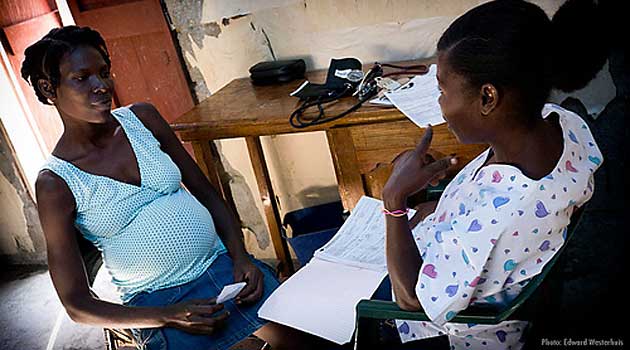 In February 2011, under the guidance of HVH’s Director of Women’s Health, Dr. Emmanuelle Britton, a prenatal/postpartum outreach program was launched. Currently HVH is conducting weekly clinics that rotate through the surrounding villages of Santé Pou Yo, including Guiotin, Morne, Bouchi, Mongoio, Monben and most recently has expanded to include Norman and Titoit.
In February 2011, under the guidance of HVH’s Director of Women’s Health, Dr. Emmanuelle Britton, a prenatal/postpartum outreach program was launched. Currently HVH is conducting weekly clinics that rotate through the surrounding villages of Santé Pou Yo, including Guiotin, Morne, Bouchi, Mongoio, Monben and most recently has expanded to include Norman and Titoit.
This outreach ensures follow-up with already known pregnant women and alerts us to any newly pregnant women.
Currently, HVH is providing healthcare to over 100 pregnant women who all receive initial maternal health education, an extensive antenatal assessment reviewing past pregnancies, a review of past and current medical history, a psychosocial assessment, a review of current pregnancy and a one month supply of prenatal vitamins. HVH’s full-time nurse, who has been trained by visiting medical personnel on how to conduct the visits, performs much of this work.
Additionally, each woman over 6 months gestational age is given a safe-birthing kit to be used during the delivery.
Women with risk factors or health concerns are asked to follow-up with the doctor in the clinic and are given free consultation cards. If further specialty care is indicated, they are referred to one of the other health facilities in the North. The goal is that each pregnant woman will receive a minimum of 3 visits pre-partum and 1 postpartum visit. The program currently services 100 women with the hope of expansion to 500 in the upcoming year.
As women typically stay at home during the initial postpartum period, community health workers have been trained in initial postpartum assessment and counseling. Any raised concerns will be brought to the clinic staff's attention for further assessment and management.
Ongoing training opportunities have been established for local Traditional Birthing Attendants (TBAs) as evidence suggests that when TBAs are provided with training to improve skills, maternal and neonatal survival rates also improve.
Education topics include antenatal care, intrapartum care, recognition of obstetrical complications and emergencies, initial postpartum care and neonatal resuscitation. They are also being provided with a kit to assist them in caring for women during labor. HVH has researched and established relationships with the TBAs and larger health facilities to handle obstetrical emergencies that should arise. HVH's vehicle is used as an ambulance for emergency transfers. HVH also provides educational sessions on maternal health with the women in small group sessions.






